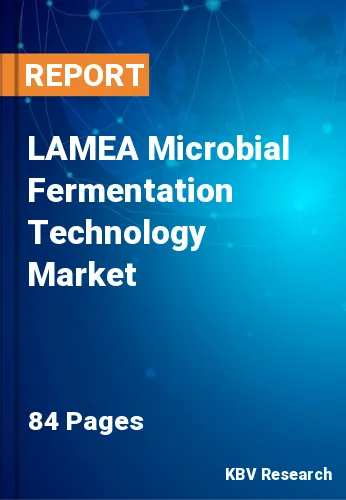The Latin America, Middle East and Africa Microbial Fermentation Technology Market would witness market growth of 7.8% CAGR during the forecast period (2022-2028).
A wide range of drugs and vaccines, including antibody fragments, pneumococcal vaccinations, and hormones, are produced utilizing microbial fermentation processes. The utilization of high agitation rates and high-shear radial impeller systems is made possible because bacterial cells are frequently resistant to shear damage. This increases the mass transfer potential of the fermentors, enabling them to support cultivations of quickly metabolizing, densely packed microbial cells and boosting the quantity of end product that can be created by the bioprocesses as well.
Therefore, the market is expected to expand substantially in the upcoming years due to the growing utilization of SUB fermentors for bacterial fermentation. The usability of fermentation technology has increased, particularly in healthcare and food & beverage. In addition, substitute protein sources can be created through fermentation. In order to create more tasty protein foods like tempeh and fermented tofu, it is frequently employed to transform current protein foods, especially those derived from plants like soy.
Recombinant protein is created using a more advanced fermentation to provide meat, dairy, cheese, and egg alternatives. Instances include recombinant myoglobin for faux meat, recombinant leghemoglobin for faux meat, recombinant whey for dairy replacement, and recombinant egg white. Meat has distinctive texture, flavor, color, and scent due to heme proteins, including myoglobin and hemoglobin. Even though the materials for myoglobin and leghemoglobin come from a vat rather than meat, they can still be employed to mimic this feature.
The United Arab Emirates (UAE) has a comprehensive public health system that the administration supports, as well as a rapidly growing private health sector that offers residents in the country high-quality medical care. The management of public healthcare services is the responsibility of numerous regulatory bodies at the federal and emirate levels. The Health Authority-Abu Dhabi (HAAD), Dubai Health Authority (DHA), and the Emirates Health Authority are some of the primary regulating bodies that manage the healthcare sector. In addition, growing investment in the UAE's healthcare industry will help the regional market expand.
The Brazil market dominated the LAMEA Microbial Fermentation Technology Market by Country in 2021, and would continue to be a dominant market till 2028; thereby, achieving a market value of $692.8 million by 2028. The Argentina market is experiencing a CAGR of 8.4% during (2022 - 2028). Additionally, The UAE market would display a CAGR of 7.5% during (2022 - 2028).
Based on Application, the market is segmented into Antibiotics, Recombinant Proteins, Enzymes, Monoclonal Antibodies, Probiotics Supplements, Vaccines, Biosimilars, Small Molecules and Others. Based on End User, the market is segmented into CMOs & CDMOs, Bio-Pharmaceutical Companies, Contract Research Organizations (CROs) and Others. Based on countries, the market is segmented into Brazil, Argentina, UAE, Saudi Arabia, South Africa, Nigeria, and Rest of LAMEA.
Free Valuable Insights: The Worldwide Microbial Fermentation Technology Market is Projected to reach USD 42.4 Billion by 2028, at a CAGR of 5.4%
The market research report covers the analysis of key stake holders of the market. Key companies profiled in the report include Biocon Limited, BioVectra Inc. (H.I.G. Capital, LLC), Danone S.A., F. Hoffmann-La Roche Ltd., Koninklijke DSM N.V., Lonza Group AG, Novozymes A/S (Novo Holdings A/S), Corbion N.V., and Bangalore Biotech Labs Pvt. Ltd. (BiOZEEN).
By Application
By End User
By Country
Our team of dedicated experts can provide you with attractive expansion opportunities for your business.

